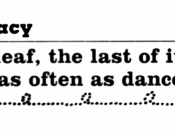Fallacy Summary and Application Paper
Fallacy: defined by Merriam-Webster as "deceptive appearance" or "false or mistaken idea". Fallacies are everywhere in the media, workplace, and even the home. Fallacies contain relevance, premises, arguments, and factual errors. In business today, it is important to be able to identify fallacies or organizational profitability could be adversely affected. This paper will define three fallacies, explain their significance to critical thinking, discuss the general application to decision-making, and provide examples that illustrate each fallacy.
Further analysis of fallacies indicates several characteristics common in all fallacies. Most typical are logical fallacies. Logical fallacies are errors in interpretation. They can be categorized into relevant fallacies, where the premises are not relevant to the conclusion, and insufficient evidence fallacies, where the premises of the argument do not supply adequate evidence to support the conclusion. Fallacies always have two premises and a conclusion. These premises create two types of arguments.
Deductive arguments provide some support for the conclusion, but not complete support. Inductive arguments create a strong case for the premises and conclusion to be true. Some fallacies are factual errors. Factual errors are simply mistakes about the facts. Regardless of the characteristics of the fallacies, identification of fallacies is essential for high-producing organizations.
The red herring fallacy is a logical fallacy where an individual introduces an irrelevant issue into a discussion to draw attention away from a core issue. As a result, the conclusion is not relevant to the original issue. For example, a reporter asks the President of the United States if he supports Roe v. Wade. President Bush may answer by describing the types of judges he would appoint. A red herring fallacy is committed because when President Bush was asked about his position on abortion, he responded with a different question as a diversionary...


